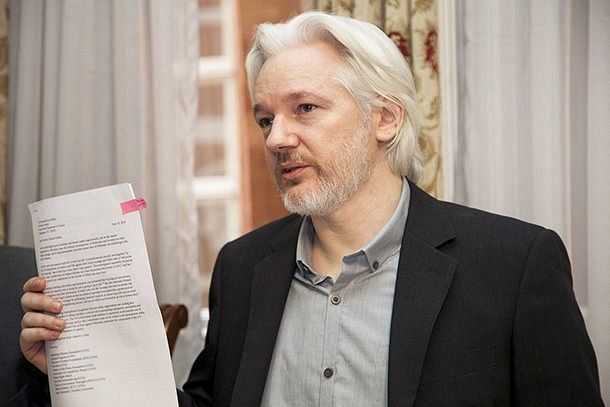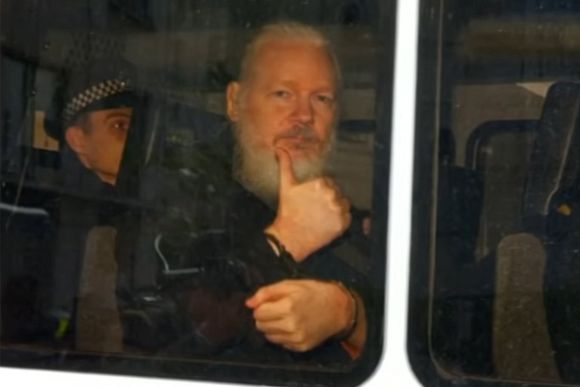District Justice Vanessa Baraitser gave supporters of WikiLeaks founder Julian Assange a surprise on Monday in blocking the request for extradition by the U.S.
Her record on granting extraditions has been near perfect: some 96% of cases.
Surely the notorious Assange, to whom she has shown conspicuous indifference when not disdainful, would also be added to her list of potted scalps? He is, after all, facing a U.S. Department of Justice indictment with 17 charges based on the Espionage Act of 1917 and one of conspiracy to commit computer intrusion.
What tilted the case in Assange’s favour was his precarious mental state and the imminent danger of suicide, were he to be extradited to the United States for trial. There would be 'conditions of near-total isolation' in the supermax facility that would most likely house him.
There was also a:
'... real risk that … Assange will be subject to restrictive special administrative measures [SAMs].'
Should the publisher be:
'... subjected to the extreme conditions of SAMs, [his] mental health will deteriorate to the point where he will commit suicide with the "single-minded determination" described by Dr [Quinton] Deeley.'
The judge was further:
'satisfied that Mr Assange’s suicidal impulses will come from his psychiatric diagnoses rather than his own voluntary act ... it would be oppressive to extradite [Assange] to the United States of America.'
The decision, however, is no celebration of journalism or its merits. Through her judgment, Baraitser adopted various approaches, essentially accepting most of the arguments put to her by the prosecution.
There is, for instance, little room in her legal universe for journalists who publish national security information. She also takes the battering ram to Assange’s activities, distinguishing them from journalism proper.
She swallows whole the argument that the WikiLeaks publisher went out of his way to harm U.S. informants by revealing their names by releasing un-redacted cables. His redaction efforts, many of which were extensively documented at the trial, were resolutely ignored.
Judge Baraitser preferred to accept the speculative testimony of Assistant U.S. Attorney in the Eastern District of Virginia, Gordon Kromberg. There were supposedly “well over one hundred people” affected by the WikiLeaks disclosures; these caused “quantifiable” harm such as the loss of employment or the freezing of assets.
Even if Assange had been "acting within the parameters of responsible journalism" he had no vested:
'... right to make the decision to sacrifice the safety of these few individuals, knowing of their circumstances or the dangers they faced, in the name of free speech.'
The judgment’s focus on hacking inspires Varaitser to distinguish Assange’s conduct from the run-of-the-mill hacks. The right to free expression as protected by Article 10 of the European Charter of Human Rights came with imposed responsibilities and the “technical means” used in gathering information.
Such technical means did not include conspiracies to hack computer systems.
The way the Judge dealt with the allegation of conspiracy to hack computer systems is particularly troubling. She honed in on prosecution claims that Assange, in concert with U.S. Private Chelsea Manning, had:
'... agreed to use the rainbow tools, which he had for the purpose of cracking Microsoft password hashes, to decipher an alphanumeric code [Manning] had given him.'
The code was tailored for:
'... an encrypted password hash stored on a Department of Defence computer connected to the SIPRNet [Secret Internet Protocol Router Network].'
Again, this puts Baraitser in a poor light. The trial testimony from Patrick Eller, formerly of the U.S. Army Criminal Investigation Command headquarters at Quantico, was particularly damning of the prosecution theory. Eller revealed on September 25, 2020 at the Old Bailey:
“[Manning] already had legitimate access to all the databases from which she downloaded the data.”
To have logged:
“... into another user account would not have provided her with more access than she already possessed.”
The prosecution had failed to consult, in detail, Manning’s court-martial records. Eller did not make the same mistake, claiming that she never supplied the two files essential in generating the decryption key for the password hash:
“At the time, it would not have been possible to crack an encrypted password hash, such as the one Manning obtained.”
In any case, Manning already had access, making any conspiracy redundant.
This was of little concern to the judicial head of Baraister:
'This is the conduct which most obviously demonstrates Mr Assange’s complicity in Ms Manning’s theft of the information and separates his activity from that of the ordinary investigative journalist.'
Assange had also allegedly engaged in conduct that would amount to offences in English law, not only with Manning, but with 'computer hackers Teenager, Laurelai, Kayla, Jeremy Hammond, Sabu and Topiary to gain unauthorised access to a computer'.
Baraitser has little time for the publishing philosophy of WikiLeaks. Assange, she noted disapprovingly, embraced a:
'... wider scheme, to work with computer hackers and whistle blowers to obtain information for WikiLeaks.'
He attended various conferences with a hacktivist theme: the “Hacking at Random” conference held in August 2009 and the “Hack in the Box Security Conference” in October that year.
The second point evident in Baraitser’s decision is the view that national security journalism can never deal with stolen goods, which are the bread and better of holding the state and abusive power to account. Motivation and intent under the UK Official Secrets Act of 1989 to expose a wrong was irrelevant.
Those with secrets had to be prevented from disclosing them; the role of whether information should be made publicly available had to be left to 'trusted people in a position to make an objective assessment of the public interest'.
At times, the judgment betrays a dangerous naiveté or wilful blindness. It refuses to accept, for instance, that Assange’s case could be 'manipulated for political purposes at the behest of the executive or the CIA'.
The judgment also claims that:
'... there is no credible evidence [to reach a conclusion] that federal prosecutors have improper motives for bringing these charges or to find they have acted contrary to their obligations and responsibilities of impartiality and fairness.'
The case against Assange has been political from start, typified by the language of persecution and, in some cases, proposed assassination. Let us take one startling example. The British minister responsible for approving Assange’s extradition, Sajid Javid, attended off-the-record meetings and conferences hosted by the American Enterprise Institute (AEI).
The influential, security-minded think tank has always had it in for WikiLeaks. One of its research fellows, Jonah Goldberg, has openly wondered why Assange:
“... wasn’t … garrotted in his hotel room years ago. It’s a serious question.”
Another friend of the AEI, neo-conservative Bill Kristol, has also chewed over the options, including the harassment, snatching or neutralising of Assange. Javed, Goldberg and Kristol were in attendance at an AEI conference in 2018.
During the trial, Assange’s defence team managed to produce revealing testimony from two former employees of the Spanish security firm UC Global SL, confirming that such sentiments were not merely the preserve of homicidal think-tankers.
The company’s owner and director, David Morales, had charged the employees in question with a grave mission: spying on Assange, his legal team and his visitors in the Ecuadorian Embassy in London.
The gathered information was accordingly relayed to U.S. intelligence. One of the witnesses was particularly shocked by proposals put forth by U.S. agents to kidnap the publisher or, failing that, poisoning him.
Baraitser took note of the investigation by the Spanish High Court, the Audiencia Nacional, into Morales, but preferred to avoid going into details. As allegations against Morales, including breaching Assange’s privacy and passing on information to US intelligence services, were 'still being investigated', it would be 'inappropriate for this court to make findings of fact'.
Effectively negating the testimony of the former UC Global employees, the judge could confidently say that the defence had done little to convince her that this had been 'a politically motivated prosecution'. The intelligence community regarded Assange “as a threat to the national defence”.
But there was:
'... no indication that this has translated into hostility from the Trump Administration or that officials from the administration put improper pressure on federal prosecutors to bring these charges.'
In the immediate aftermath of the decision, WikiLeaks editor-in-chief Kristinn Hrafnsson was gravely accurate in his assessment:
'It is a win for Julian Assange, but it is not a win for journalism.'
The U.S. Department of Justice, reluctant to give up the chase, promises to appeal to the High Court. Instead of being released, the publisher now finds himself back in Belmarsh prison, his bail application rejected. This was a sharp return to form for Baraitser:
'Notwithstanding the package offered by the defence, I am satisfied he might abscond.'
The persecution continues.
Dr Binoy Kampmark was a Cambridge Scholar and is an Independent Australia columnist and lecturer at RMIT University. You can follow Dr Kampmark on Twitter @BKampmark.
Related Articles
- Julian Assange's denial of freedom an affront to human rights
- Assange extradition denial: How human rights experts have responded
- Assange case: The 'right decision for the wrong reason'
- Julian Assange: Three myths destroyed by defence witness statements
- EXCLUSIVE: Q and A with Julian Assange's lawyer Jennifer Robinson
 This work is licensed under a Creative Commons Attribution-NonCommercial-NoDerivs 3.0 Australia License
This work is licensed under a Creative Commons Attribution-NonCommercial-NoDerivs 3.0 Australia License
Support independent journalism Subscribe to IA.
















